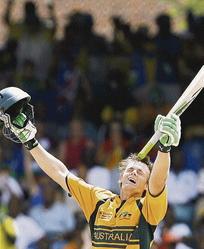
Tony Becca The 2007 Cricket World Cup is over and as good as it was, for many reasons, it was on and off the field - not the best ever; and in the days ahead, in an effort to find out what went wrong, many words, thousands of words, will be, or may be written about it.
Today, however, these words are about the final day - the day when fans from Australia, Sri Lanka, India, Pakistan, New Zealand, England, South Africa, North America and from all around the West Indies, packed Kensington Oval to capacity to witness the showdown between Australia and Sri Lanka.
What they saw, however, was a superb, brilliant and unforgettable innings and a disappointing and embarrassing fiasco of a finish.
As one who believes in saving the best for last, however, let's deal with the fiasco first.
After the match was cut from 50 to 38 overs, after Australia had rattled up 281 for four and after Sri Lanka's target had been revised to 269 off 36 overs, the umpires, Steve Bucknor and Aleem Dar, offered the batsmen, Chaminda Vaas and Lasith Malinga, the light, they accepted it and at 6.10 p.m. with flash bulbs lighting up the stands, everybody walked off the field.
At that stage, the scoreboard read 206 for seven off 33 overs. Everyone, including Australia and Sri Lanka, believed that the match was over, that Australia had won and the celebration started.
DIFFICULT TO SEE
Ten minutes later, however, the lighting was so poor, itwas difficult to see the players. The umpires and the players walked back onto the field and with two slow bowlers in action, bowled the three remaining overs before leaving the field again, at 6.30, with the score, this time, 215 for eight off the allotted 36 overs.
It was total confusion and it was sometime afterwards that we (the media) were told what had transpired, or rather what was supposed to have transpired.
In the midst of the Australian celebration, Rudi Koertzen - the third umpire, went to the two umpires and told them that the match was not over. The umpires then went to the two captains and told them that the match was not over, that three overs were left to be bowled and that they would have to come back the following day.
The two captains, who believed that the match was over according to the rules, then decided that Sri Lanka could not have won the match, that Australia had won the match and that instead of coming back the next day, they would go out and bowl the three overs.
They also agreed that because of the darkness, Australia would use slow bowlers and Sri Lanka would not try to win the game.
DISGRACE

Australia's Adam Gilchrist celebrates his century during their Cricket World Cup final against Sri Lanka in Bridgetown on Saturday. - Reuters
To end a World Cup final like that was more than a fiasco: it was a total embarrassment, bordering on a disgrace.
The rules state quite simply that in the event of an interrupted match, once the team batting second has batted 20 overs, it is a match and the result must be determined by the Duckworth/Lewis rule.
In other words, once the two teams have batted a minimum of 20 overs each, there is no second day, when the Sri Lanka innings had passed 20 overs, almost all the reporters in the Press Box were happy because they did not have to return the following day and one wonders what went wrong with umpires Bucknor and Dar, with third umpireKoertzen, and also with match referee Jeff Crowe who could have and should have intervened.
If that was not the case, if play, even after 20 overs, was supposed to continue the following day, why then reduce the overs from 50 to 38 and why then, when Sri Lanka replied, further reduced the overs from 38 to 36?
If that was the case, if after 20 overs play was still to be continued into a second day, why reduce the number of overs from 50 in the first place - why not, with so much more time available, continue with 50 overs a side and make it a real match.
BLESSING
It was a blessing in disguise that Australia were so strong, so dominant and was in such an impregnable position that it did not matter whether they stopped, whether they played in the darkness, or whether they had continued the following day - and also that Sri Lanka were honest enough to see that they could not win and came to an agreement that Australia could use their slow bowlers because they would not even try to win the match.
It was so dark, however, that they probably could not even see the ball much more to hit it.
The World Cup is all about cricket, because it is a one-day limited-overs game, it is all about batting and to me, the memory of the final will not be about the blunder by the officials.
UNFORGETTABLE
To me, the memory, the unforgettable memory of the World Cup final will be Adam Gilchrist's innings.
It was truly magnificent and it was fit not only for the full house of flag-waving spectators from all around the world, it was also fit for an audience of kings and queens, princes and princesses.
Starting with a gentle push to backward square-leg off Vaas for a single, the left-hander went around the compass, driving and cutting, hooking and pulling all the bowlers along the ground and in the air, before he was caught by Chamara Silva in the covers off Dilhara Fernando - the ball hit so hard and soared so high, it almost touched the clouds drifting above.
For 129 minutes while facing 104 deliveries, Gilchrist was at his glorious best: he went back, he went forward, he stood tall in his stance, he smashed 13 fours and eight sixes and apart from those which flashed to or sailed over the boundary, every one of his strokes came out of the middle of his bat.

